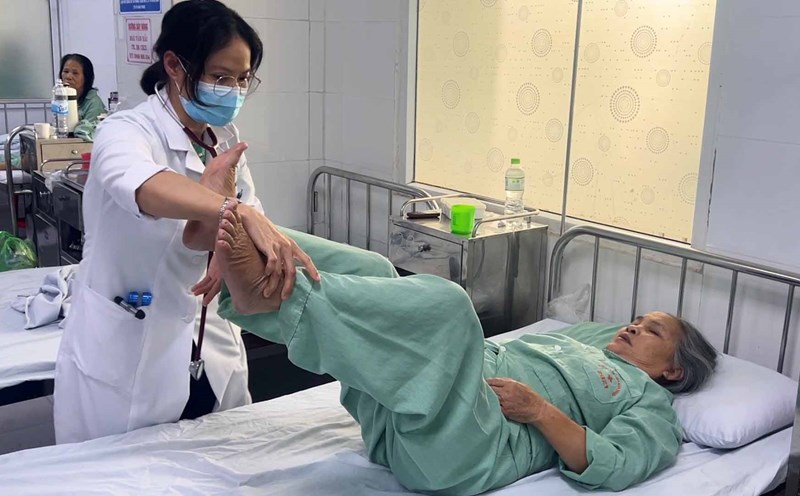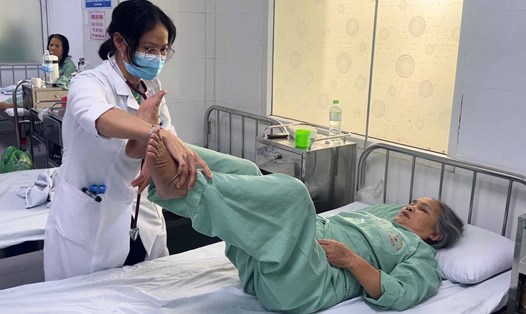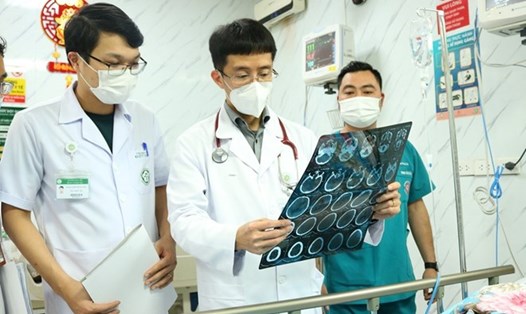Young people have strokes
On the night of December 6, when the cold air started to appear, male patient D.V.D (45 years old, Hanoi) with no medical history, was rushed to the emergency room in a coma after taking a late night shower. The diagnosis showed a cerebral hemorrhage with a 90 cm³ blood volume. The patient was forced to undergo open skull surgery to relieve brain pressure. Currently, the patient is still receiving intensive treatment, maintaining mechanical ventilation, and has a very poor prognosis.
Another case, patient N.X.K, 42 years old, in Hai Duong, after bathing at night on December 17. Afterwards, the patient suddenly had a headache, consciousness gradually slowed down and fell into a coma. He was given first aid at the front line and transferred to the 108 Military Central Hospital at 3:00 p.m. Although he was actively resuscitated, the brain hemorrhage was too severe and the patient was in a deep coma and could no longer be saved.
Both cases above were quite young patients, without chronic diseases, the accident occurred after sudden exposure to cold, leaving serious sequelae and threatening the patient's life. This unfortunate event could not have happened if we knew how to prevent it properly.
Dr. Nguyen Ngoc Uyen, Emergency Department (108 Military Central Hospital) said that cold weather not only causes blood vessels to constrict, increasing blood pressure, but also increases the risk of blood clots, leading to both strokes due to cerebral hemorrhage and cerebral infarction. In particular, the habit of bathing late at night - a common problem in Vietnam - has become the cause of many unfortunate cases.
Why is stroke more likely to occur in cold weather?
Doctor Thai Dam Dung, Emergency Department (108 Military Central Hospital) said that exposure to cold is a risk factor that promotes an increase in stroke, both hemorrhagic stroke and ischemic stroke; Vasospasm. This explains why hemorrhagic stroke is often highest on the first day of exposure to cold.
In addition, the phenomenon of vasoconstriction that helps keep the body from losing water also increases blood viscosity. Decreased temperature also causes the body to increase the production of red blood cells and platelets to increase the body's metabolism, leading to the formation of blood clots. This increases the risk of blood vessel blockage leading to cerebral infarction. This explains why cerebral infarction often occurs after a few days of exposure to cold.
The signs of cold-weather stroke are similar to the usual signs: Facial deviation, numbness or weakness on one side; Weakness or inability to lift one arm; Difficulty speaking, stuttering or not understanding speech; Immediate emergency care, because the golden time in the first 6 hours determines the effectiveness of treatment.
In addition, you should also pay attention to other symptoms such as severe headache, dizziness, loss of vision or sudden loss of balance...
What to do when you meet someone with a stroke in the cold season?
Doctor Nguyen Ngoc Uyen advises: Take the patient to the nearest medical facility. Taking the patient to the hospital early helps the patient receive timely treatment to limit future complications.
If you are not a medical staff, while waiting for emergency care, you should not arbitrarily give the patient any medicine because some medicines will make the brain hemorrhage worse and make the complications more severe, increasing the risk of death. In addition, it is important to note not to prick the patient's finger; do not move or shake the patient; do not let the patient eat or drink to avoid choking... Family members should also not scrape the patient's back or squeeze lemon into the patient's mouth. These are misconceptions that do not support the stroke victim.
For people with stroke in cold weather, the patient should lie on one side, loosen the clothes, avoid letting the patient wear clothes that are too tight. Record the time the patient shows signs of stroke as well as the patient's symptoms so that they can be provided to medical staff.
Stroke is considered an acute disease, often occurring very suddenly and often causing death or disability later. However, this is a disease that can be completely prevented by keeping the body warm, controlling blood pressure, having a healthy diet, exercising regularly, limiting alcohol and tobacco, and having regular health check-ups...











